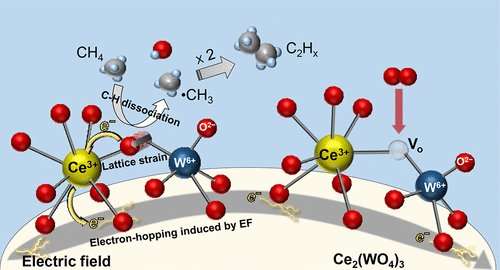Reaction mechanisms for the oxidative coupling of methane (OCM) over Ce2(WO4)3 catalysts at low temperatures in an electric field. Credit: Waseda University
The increased supply and optimized cost of natural gas have pushed chemical industries to seek new ways of converting methane, the main constituent of natural gas, to ethylene, a hydrocarbon widely used in chemical products such as plastic. Oxidative coupling of methane (OCM) is of high interest as a potentially efficient method, but is still impractical for commercial applications—for example, the reaction temperature is over 700 degrees C, requiring expensive equipment with high heat resistance, which increases production cost.
Scientists at Waseda University discovered a new OCM reaction mechanism occurring at a temperature as low as 150 degrees C. The novel catalytic reaction, which demonstrated both high yield and catalytic activity, was done in an electric field, and could provide a more cost-effective method of synthesizing ethylene in the future. The findings were published in the Journal of Physical Chemistry C on January 22, 2018.
"Performing OCM in an electric field dramatically lowered the reaction temperature, and we succeeded in efficiently synthesizing C2 hydrocarbon, including ethylene, from oxygen in the atmosphere with methane," says Shuhei Ogo, assistant professor of catalytic chemistry at Waseda.
He explains that by applying an electric field, the lattice oxygen of a catalyst is activated and becomes a reactive oxygen species, even at temperatures as low as 150 degrees C. "The redox reaction mechanism, which repeats the consumption and regeneration of the reactive oxygen species on the catalyst surface, keeps the catalytic reaction cycle going." Reports on such phenomenon are unprecedented, and the results of this study are considered to be the first of its kind in the world.
This reaction mechanism can lower the production cost of ethylene because high-temperature heat sources and large-scale heat exchanger devices become unnecessary, holding the cost on facilities and its management down as well. Not only large-scale manufacturers, but small to mid-sized gas wells with smaller production scales can also benefit from the reduced cost.
"The findings of this study can be utilized for various kinds of catalytic reaction that proceeds by redox reaction mechanism, while providing high selectivity and stability as well as energy efficiency at low temperature," Ogo adds.
The research group plans to further investigate the highly active and selective catalyst in the electric field.
More information: Shuhei Ogo et al, Electron-Hopping Brings Lattice Strain and High Catalytic Activity in the Low-Temperature Oxidative Coupling of Methane in an Electric Field, The Journal of Physical Chemistry C (2018). DOI: 10.1021/acs.jpcc.7b08994
Journal information: Journal of Physical Chemistry C
Provided by Waseda University
























